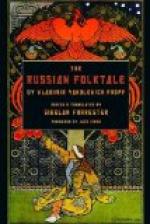Drama of England. One half of La Fontaine’s
Fables are of Indian sources.
1326. The Gesta Romanorum, written in Latin. This was a compilation, by the monks, of stories with a moral appended to each. It was the most popular story-book before the invention of printing. In England it was printed by Wynkyn de Worde, of which edition the only known copy is at St. John’s College, Cambridge. The earliest manuscript of the collection is dated 1326. Between 1600 and 1703 fifteen editions of the book prove its popularity. One English version is by Sir Frederick Madden, who lived 1801-73. The author of the Gesta Romanorum is unknown, but was likely a German. The stories included are miscellaneous and vary in different editions. Among its stories are Oriental tales, tales of the deeds of Roman Emperors, an early form of Guy of Warwick, the casket episode of The Merchant of Venice, a story of the Jew’s bond, a tale of the Emperor Theodosius, being a version of King Lear, the story of the Hermit, and a tale of Aglas, the daughter of the Roman Emperor Pompey, being a version of Atalanta and her Race.
1000 A.D. (about). Shah-Nameh, or King-book of Persia, by Ferdousee, born about 940 A.D. This book is the pride and glory of Persian literature. It was written by the Persian poet at the command of the king, who wished to have preserved the old traditions and heroic glories of Persians before the Arabian conquest. Ferdousee declared that he invented none of his material, but took it from the Bostan-Nameh or Old-Book.
The King-Book is very ancient, it is the Persian Homer. It was the labor of thirty years. It consisted of 56,000 distichs or couplets, for every thousand of which the Sultan had promised the poet one thousand pieces of gold. Instead of the elephant-load of gold promised, the Sultan sent in payment 60,000 small silver coins. This so enraged the poet that he gave away one third to the man who brought them, one third to a seller of refreshments, and one third to the keeper of the bath where the messenger found him. After the poet’s death the insult was retrieved by proper payment. This was refused by his one daughter, but accepted by the other and used to erect a public dike the poet had always desired to build to protect his native town from the river. The fine character of the tales of the King-Book is shown in the tale of Roostem and Soohrab, taken from this book, which Keightley has translated in Tales and Popular Fictions. Keightley considered it superior to any Greek or Latin tale. Modern literature knows this tale through Matthew Arnold’s poem.
1548 (not later than). The Thousand and One Nights, Arabian. 12 volumes. Galland’s French translation appeared in 1704. This was supplemented by Chavis and Cazotte, and by Caussin de Percival. Monsieur Galland




